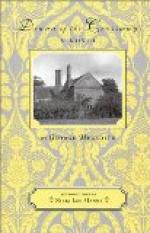’That was Count Jochany, a cousin of the princess, and a cavalry officer,’ said Emma. ’You don’t know the other? I am sure the one you mean must be Percy Dacier.’
His retiring was explained: the Hon. Percy Dacier was the nephew of Lord Dannisburgh, often extolled to her as the promising youngster of his day, with the reserve that he wasted his youth: for the young gentleman was decorous and studious; ambitious, according to report; a politician taking to politics much too seriously and exclusively to suit his uncle’s pattern for the early period of life. Uncle and nephew went their separate ways, rarely meeting, though their exchange of esteem was cordial.
Thinking over his abrupt retirement from the crowded semicircle, Diana felt her position pinch her, she knew not why.
Lady Dunstane was as indefatigable by day as by night in the business of acting goddess to her beloved Tony, whom she assured that the service, instead of exhausting, gave her such healthfulness as she had imagined herself to have lost for ever. The word was passed, and invitations poured in to choice conversational breakfasts, private afternoon concerts, all the humming season’s assemblies. Mr. Warwick’s treatment of his wife was taken by implication for lunatic; wherever she was heard or seen, he had no case; a jury of some hundreds of both sexes, ready to be sworn, pronounced against him. Only the personal enemies of the lord in the suit presumed to doubt, and they exercised the discretion of a minority.
But there is an upper middle class below the aristocratic, boasting an aristocracy of morals, and eminently persuasive of public opinion, if not commanding it. Previous to the relaxation, by amendment, of a certain legal process, this class was held to represent the austerity of the country. At present a relaxed austerity is represented; and still the bulk of the members are of fair repute, though not quite on the level of their pretensions. They were then, while more sharply divided from the titular superiors they are socially absorbing, very powerful to brand a woman’s character, whatever her rank might be; having innumerable agencies and avenues for that high purpose, to say nothing of the printing-press. Lady Dunstane’s anxiety to draw them over to the cause of her friend set her thinking of the influential Mrs. Cramborne Wathin, with whom she was distantly connected; the wife of a potent serjeant-at-law fast mounting to the Bench and knighthood; the centre of a circle, and not strangely that, despite her deficiency in the arts and graces, for she had wealth and a cook, a husband proud of his wine-cellar, and the ambition to rule; all the rewards, together with the expectations, of the virtuous. She was a lady of incisive features bound in stale parchment. Complexion she had none, but she had spotlessness of skin, and sons and daughters just resembling her, like cheaper editions of a precious quarto of a perished type.




